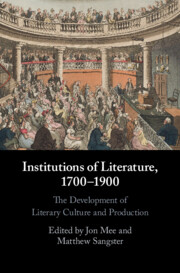Book contents
- Institutions of Literature, 1700–1900
- Institutions of Literature, 1700–1900
- Copyright page
- Contents
- Figures
- Contributors
- Acknowledgements
- Introduction Literature and Institutions
- Chapter 1 Knowledge Exchange in the Seventeenth Century
- Chapter 2 ‘Supporting Mutual Benevolence’
- Chapter 3 Institutions without Addresses
- Chapter 4 Eighteenth-Century Musenhof Courts as Bridges and Brokers for Cultural Networks and Social Reform
- Chapter 5 Becoming Institutional
- Chapter 6 Circulating Libraries as Institutional Creators of Genres
- Chapter 7 Lecturing Networks and Cultural Institutions, 1740–1830
- Chapter 8 Catalogues as Instituting Genres of the Nineteenth-Century Museum
- Chapter 9 Charles Lamb and the British Museum as an Institution of Literature
- Chapter 10 A Disruptive and Dangerous Education and the Wealth of the Nation
- Chapter 11 ‘The Ladies’ Contribution’
- Chapter 12 ‘[L]etters Must Increase’
- Chapter 13 Networks, Nodes, and Beacons
- Chapter 14 The Book as Medium
- Index
Chapter 4 - Eighteenth-Century Musenhof Courts as Bridges and Brokers for Cultural Networks and Social Reform
Published online by Cambridge University Press: 30 June 2022
- Institutions of Literature, 1700–1900
- Institutions of Literature, 1700–1900
- Copyright page
- Contents
- Figures
- Contributors
- Acknowledgements
- Introduction Literature and Institutions
- Chapter 1 Knowledge Exchange in the Seventeenth Century
- Chapter 2 ‘Supporting Mutual Benevolence’
- Chapter 3 Institutions without Addresses
- Chapter 4 Eighteenth-Century Musenhof Courts as Bridges and Brokers for Cultural Networks and Social Reform
- Chapter 5 Becoming Institutional
- Chapter 6 Circulating Libraries as Institutional Creators of Genres
- Chapter 7 Lecturing Networks and Cultural Institutions, 1740–1830
- Chapter 8 Catalogues as Instituting Genres of the Nineteenth-Century Museum
- Chapter 9 Charles Lamb and the British Museum as an Institution of Literature
- Chapter 10 A Disruptive and Dangerous Education and the Wealth of the Nation
- Chapter 11 ‘The Ladies’ Contribution’
- Chapter 12 ‘[L]etters Must Increase’
- Chapter 13 Networks, Nodes, and Beacons
- Chapter 14 The Book as Medium
- Index
Summary
In the German-speaking territories of eighteenth-century Europe, Musenhof courts were sites where rulers surrounded themselves with artists and intellectuals, writers and musicians. They were a conspicuous feature of geopolitical environments where smaller courts and principalities were being fashioned into the larger cultural units of the Holy Roman Empire and Brandenburg-Prussia (later the Kingdom of Prussia). Though aristocratic in inception and genesis, Musenhof courts functioned as bridges and brokers for diverse artistic, social, and literary networks across the German-speaking world. They provided a permeable environment where overlapping social networks straddled the court and the public sphere.
This chapter juxtaposes three contrasting Musenhof courts in order to highlight their contribution as sites for cultural brokering in their regions. It considers three different models of the Musenhof, located in Weimar, Saxe-Weimar-Eisenach; Königsberg, East Prussia; and the Duchy of Kurland, hosted by Anna Amalia (1739–1807), Charlotte Caroline Amalia von Keyserling(k) (1727–1791), and Dorothea von Kurland (1761–1821). Through comparison, it charts a paradigm shift in the history of the Musenhof from aristocratic spaces of (cosmopolitan) sociability and patronage to exempla for socio-political and economic reforms.
Keywords
- Type
- Chapter
- Information
- Institutions of Literature, 1700–1900 , pp. 83 - 100Publisher: Cambridge University PressPrint publication year: 2022

